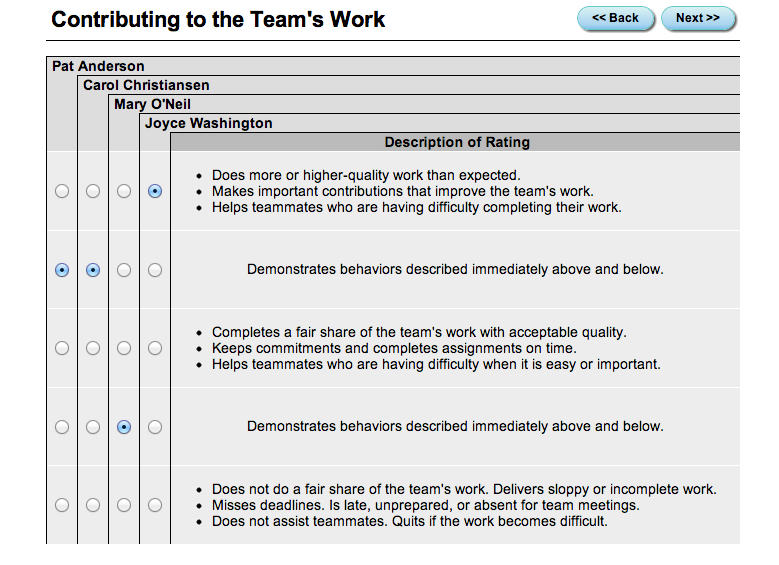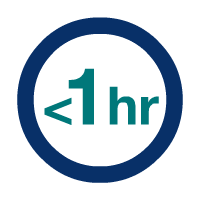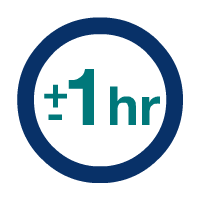CATME Peer Evaluation
 What is it and how does it work?
What is it and how does it work?
Developed by Purdue University with support from the National Science Foundation, the Comprehensive Assessment of Team Member Effectiveness (CATME) tool suite facilitates the ability of students to rate their own collaboration skills as well as those of their peers in group projects via the Peer Evaluation survey (Loughry, Ohland, & Moore, 2007; Ohland et al., 2012). All Peer Evaluation surveys include ratings on the following attributes: Contributing to the Team’s Work, Interacting with Teammates, Keeping the Team on Track, Expecting Quality, and Having Relevant KSAs (Knowledge, Skills, and Abilities). There are multiple optional modules including team satisfaction, interdependence, conflict, cohesiveness, peer influences, and psychological safety that can be selected by the instructor/facilitator as appropriate.
Surveys may be administered multiple times in a semester to collect longitudinal peer evaluation data. Instructors can configure the survey to release results to students for feedback purposes.
Which skill(s) are targeted?
The Peer Evaluation survey can be used to collect students' self-report ratings of their own collaboration skills as well as those of their peers:
- Participate in constructive dialogue to support both the process and product of the collaboration
- Shape teams and navigate collaborations in consideration of individual differences and interpersonal dynamics
- Apply skills and processes to resolve and manage disagreements in collaborative settings
- Participate constructively in planning, leading and improving meetings
- Plan, organize, and deliver coordinated work targeted to a project goal
Who else has used it?
- Dietrich College General Education Program
- College of Engineering Senior Design Courses
 Educator time commitment
Educator time commitment
The time commitment for educators to become familiar with either the Peer Evaluation survey varies but generally requires approximately 30-60 minutes. Student responses are available to the instructor in a formatted spreadsheet that can be downloaded from the system for instructor review.
 Student time commitment
Student time commitment
The student time commitment varies based on the number of questions (as determined by the optional question sets added by the instructor). For the Peer Evaluation tool, the size of the team may also impact time commitment as each student submits a self-evaluation as well as an individual evaluation for each team member.
Contact eberly-assist@andrew.cmu.edu for help with incorporating this resource.
Educator how-to steps
- Go to info.catme.org and request an instructor account. Use your Andrew email address so that CATME can associate your account as belonging to CMU's license. (NOTE: Set a unique CATME password, and do not use your Andrew password, as CATME is not integrated with CMU authentication). Feel free to contact eberly-assist@andrew.cmu.edu if you run into any issues with setting up your CATME instructor account.
- Optional: Review the instructor-focused CATME resources including FAQ's and videos (https://info.catme.org/instructor/) on how to incorporate CATME Peer Evaluation into your program/course design.
- Decide when students should complete the CATME Peer Evaluation survey and then include this in the corresponding assignments/instructions to students.
See these related resources...
CATME TeamMaker
CATME survey tool designed to help instructors/facilitators form teams based on survey criteria
ConflictU
OLI course designed to develop skills and strategies for managing conflicts that arise in teams.
MeetingU
OLI course designed to develop skills and strategies for managing, participating in productive meetings.
References
Loughry, M. L., Ohland, M. W., & Moore, D. D. (2007). Development of a theory-based assessment of team member effectiveness. Educational and Psychological Measurement, 67, 505-524.
Ohland, M. W., Loughry, M. L., Woehr, D. J., Bullard, L. G., Felder, R. M., Finelli, C. J., Layton, R. A., Pomeranz, H. R., & Schmucker, D. G. (2012). The comprehensive assessment of team member effectiveness: Development of a behaviorally anchored rating scale for self and peer evaluation. Academy of Management Learning & Education, 11(4), 609-630.